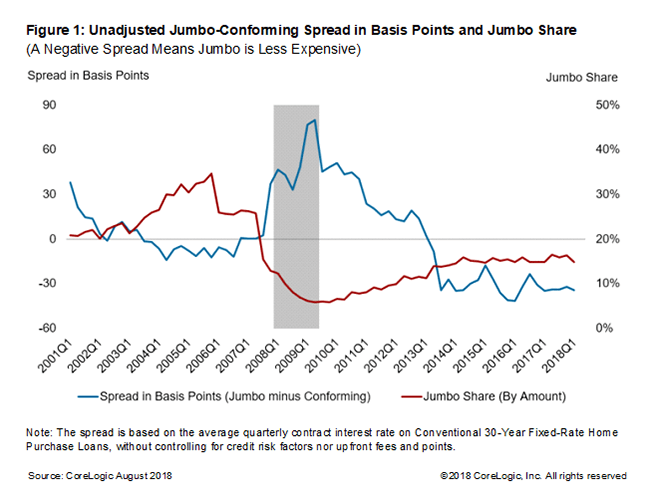Is a Jumbo Loan Right for You? Check out the Advantages and Requirements
Is a Jumbo Loan Right for You? Check out the Advantages and Requirements
Blog Article
Browsing the Jumbo Loan Landscape: Necessary Insights for First-Time Homebuyers
Navigating the intricacies of big fundings offers an unique set of difficulties for new buyers, specifically in a progressing real estate market. Comprehending the crucial eligibility demands and prospective benefits, together with the drawbacks, is critical for making educated choices. Additionally, creating a solid financial method can significantly improve your potential customers.
Recognizing Jumbo Finances

Because big lendings are not backed by government-sponsored entities, they bring various underwriting criteria and require even more extensive financial paperwork. This difference can result in higher rate of interest contrasted to traditional finances, offered the increased threat to lending institutions. Nonetheless, jumbo lendings also provide one-of-a-kind advantages, such as the capability to finance higher-value residential or commercial properties and potentially more flexible terms.
Novice homebuyers need to likewise be aware that protecting a big loan commonly necessitates a larger deposit, normally ranging from 10% to 20%. Additionally, borrowers are normally anticipated to show strong credit reliability and a steady income to qualify. Comprehending these subtleties can equip new buyers to make enlightened decisions when checking out big finance options in their pursuit of homeownership.
Qualification Needs
Safeguarding a jumbo car loan calls for conference details eligibility needs that vary significantly from those of conventional car loans. Unlike traditional lendings, which are often backed by government-sponsored entities, big finances are not insured or ensured, leading to stricter criteria.
Additionally, consumers need to show a robust monetary account, which consists of a low debt-to-income (DTI) ratio, normally no greater than 43%. This ensures that debtors can handle their month-to-month settlements together with various other economic commitments.
Furthermore, most lending institutions require significant documents, including proof of earnings, asset statements, and income tax return for the past 2 years. A significant deposit is likewise crucial; while conventional finances might enable deposits as reduced as 3%, jumbo fundings usually demand at least 20%, depending upon the loan provider and the funding quantity.

Benefits of Jumbo Car Loans
For many first-time homebuyers, jumbo financings offer unique benefits that can help with the journey toward homeownership. Among the key advantages is the capacity to finance buildings that go beyond the adjusting car loan limitations established by government-sponsored entities. This flexibility enables customers to access a bigger series of high-value homes in competitive realty markets.
In addition, jumbo financings typically include eye-catching interest rates helpful resources that can be less than those of conventional loans, particularly for consumers with strong credit profiles. This can result in substantial savings over the life of the financing, making homeownership much more budget friendly. Jumbo lendings typically permit for higher lending quantities without the requirement for private home mortgage insurance coverage (PMI), which can additionally lower total costs and regular monthly repayments.

Potential Drawbacks
Lots of possible homebuyers might discover that jumbo lendings included significant disadvantages that call for mindful factor to consider. One of the main worries is the stringent qualification standards. Unlike conforming financings, big lendings typically need higher credit rating, often going beyond 700, and significant revenue documentation, making them much less obtainable for some customers.
Furthermore, big finances typically feature higher rates of interest contrasted to traditional financings, which can result in raised monthly payments and general borrowing prices. This costs might be specifically challenging for novice buyers that are currently navigating the financial intricacies of acquiring a home.
One more noteworthy downside is the larger down repayment demand. Several loan providers anticipate a minimum down payment of 20% or even more, which can posture an obstacle for purchasers with minimal savings. The lack of federal government support for big fundings leads to much less positive terms and problems, raising the risk for lending institutions and, consequently, the borrowing prices for house owners.
Finally, market changes can substantially impact the resale worth of high-end buildings funded with big finances, adding an element of monetary changability that first-time homebuyers might find daunting.
Tips for First-Time Homebuyers
Browsing the complexities of the homebuying process can be overwhelming for newbie buyers, specifically when thinking about jumbo lendings (jumbo loan). To simplify this journey, sticking to some key approaches can make a substantial difference
First, inform on your own on jumbo financings and their particular demands. Recognize the various borrowing standards, including credit report, debt-to-income proportions, and deposit assumptions. Usually, a minimum credit scores rating of 700 and a deposit of a minimum of 20% are necessary for authorization.
2nd, involve with a well-informed mortgage expert. They can supply insights customized to your economic circumstance and aid you browse the intricacies of the big car loan landscape.
Third, consider pre-approval to reinforce your getting position. A pre-approval letter signals to sellers that you are a major purchaser, which can be beneficial in affordable markets.
Finally, do not overlook the significance of budgeting. Consider all prices connected with homeownership, consisting of real estate tax, maintenance, and house owners' insurance coverage. By following these tips, newbie buyers can come close to the jumbo financing procedure with greater self-confidence and clearness, boosting their chances of successful homeownership.
Verdict
In conclusion, browsing the jumbo lending landscape requires an extensive understanding of eligibility her latest blog standards, benefits, and prospective downsides. Ultimately, complete prep work and education and learning pertaining to jumbo finances can lead to even more enlightened decision-making in the homebuying process.
When browsing the complexities of the housing market, comprehending jumbo car loans is crucial for first-time homebuyers intending for properties that surpass conventional finance limits. Big car loans are non-conforming car loans that normally surpass the adjusting financing limitation established by the Federal Housing Finance Agency (FHFA)Furthermore, jumbo fundings often come with appealing rate of interest prices that can be lower than those of conventional fundings, especially for debtors with strong credit history profiles. Big finances typically permit for greater car loan quantities without the need for private home mortgage insurance (PMI), which can further reduce regular monthly settlements and total expenses.
Unlike adjusting loans, big financings typically call for greater credit history ratings, commonly going beyond 700, and considerable revenue documentation, making them much less available for some borrowers.
Report this page